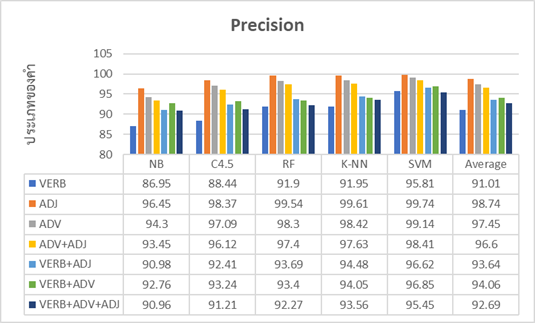Affecting of Word Types Toward Classification Models of Thai People's Feelings Towards Autism
Main Article Content
Abstract
Thai words which express both positive and negative sentiments of the writer include verbs adverbs, and adjectives. This is different from English words that use adverbs and adjectives to express the writer feelings. The purpose of this research is to study the types of words affecting the effectiveness of the Thai sentiment model on autism. Thai people's opinions on autism are gathered from social media on the Pantip website, Facebook and Twitter. There are 1,766 comments. Text mining processes are used to build the classification models. In this research, 7 datasets are used according to the type of word type including verb, adverb, adjective, adverbs and adjectives verbs and adjectives verbs and adverbs and the combine of verbs, adverbs and adjectives datasets. Such types of words can describe Thai feelings very well. In each record of each dataset, a class is defined with a bag of word principle. In order to build the effective classification models, 5 techniques are applied including the Naïve Bayes (NB), Decision Tree C4.5 (C4.5), Random Forest (RF), K-Nearest Neighbors (K-NN), and Support Vector Machine (SVM) techniques. In an experiment in order to find the types of words that affect the effectiveness of the model in this study, the 10-fold cross-validation principle is used to divide the data set into testing and training sets. Precision, Recall and F-Measure are used to show the classification efficiency of the model. The experiment results showed that the adjective dataset has highest average Precision, Recall, and F-Measure up to 98.74%, 99.57% and 99.15%, respectively.
Article Details

This work is licensed under a Creative Commons Attribution-NonCommercial-NoDerivatives 4.0 International License.
Articles published in Journal of Industrial Technology Ubon Ratchathani Rajabhat University both hard copy and electronically are belonged to the Journal.
References
Department of Empowerment of Persons with Disabilities, “Situation Report on Persons with Disabilities in Thailand in the Third Quarter of 2021.” Department of Empowerment of Persons with Disabilities. Accessed: Jul. 12, 2021. [Online]. Available: https://dep.go.th/images/uploads/files/situation_June64.pdf (in Thai)
Department of Empowerment of Persons with Disabilities, “Notification of the Ministry of Social Development and Human Security Re Types and Criteria for Disabilities (No. 2) B.E. 2555 (2012).” Department of Empowerment of Persons with Disabilities. Accessed: Jul. 12, 2021. [Online]. Available: http://web1.dep.go.th/sites/default/files/files/services/22.PDF (in Thai)
K. Atipanyawong, S. Siriboon and C. Nimnuan, “Attitude of Being Peers of Autistic Students in Integration Classroom at a Primary School,” Chulalongkorn Medical Journal, vol. 59, no. 3, pp. 301-312, 2015.
M. Malik, S. Habib and P. Agarwal, “A Novel Approach to Web-Based Review Analysis Using Opinion Mining,” Procedia Computer Science, vol. 132, pp. 1202–1209, 2018.
P. Q. Tran, N. T. Trieu, N. Vu, H. T. Nguyen and H. X. Huynh, “Effective Opinion Words Extraction for Food Reviews Classification,” International Journal of Advanced Computer Science and Applications, vol. 11, no. 7, pp. 421-426, 2020.
S. Kedtrawon and J. Thongkam, “Types of Thai words Affecting the Effectiveness of Opinion Classification Models: Case Study of Thai People's Opinions on COVID 19,” Journal of Science and Technology, Ubon Ratchathani University, vol. 24, no. 1, pp. 100-112, 2022.
W. Inplang, “Opinion Analysis on PUBG Mobile Game Using Text Mining,” M.S. thesis, Mahasarakham University, Mahasarakham, Thailand, 2020.
N. Pinmueng, “Classifying Opinions to Prompt Pay Service on Online Media Using Text Mining,” M.S. thesis, Mahasarakham University, Mahasarakham, Thailand, 2017.
P. Promnamang, W. Pongkachorn and N. Chirawichitchai, “Text Review Using Data Mining Classification Technique,” Science and Technology RMUTT Journal, vol. 6, no. 1, pp. 94-101, 2016.
A. I. Saad, “Opinion Mining on US Airline Twitter Data Using Machine Learning Techniques,” in 2020 16th International Computer Engineering Conference (ICENCO), Cairo, Egypt, Dec. 29-30, 2020, pp. 59-63.
S. Somjettana and J. Thongkam, “Performance Comparison of Data Mining Techniques for Building Classification Models of the Parent Toward Children who use Smart Phone,” Journal of Science and Technology, Ubon Ratchathani University, vol. 23, no. 1, pp. 21-30, 2021.
P. Thongkam, “Ensemble Algorithm for Feature Selection,” M.S. thesis, Thammasat University, Pathum Thani, Thailand, 2016.
W. Buathong, Data Mining, Thailand: Faculty of Science and Technology, Phuket Rajabhat University, 2016. (in Thai)
S. Hengpraprohm and S. Pranithanwitthaya, “Signal-to-Noise Ratio Feature Selection for Multi-class Classification,” Journal of Thai Interdisciplinary Research, vol. 11, no. 4, pp. 41-48, 2016.
S. Srisawakarn and S. Srisuay, “Sentiment Analysis Opinion Mining using Text Extraction,” Journal of Applied Information Technology, vol. 6, no. 2, pp. 95-104, 2020.
W. Jitsakul and S. Sodsee, “Text classification analysis by stability comparison of algorithms,” Sripatum Review of Science and Technology, vol. 9, pp. 19-31, 2017.


